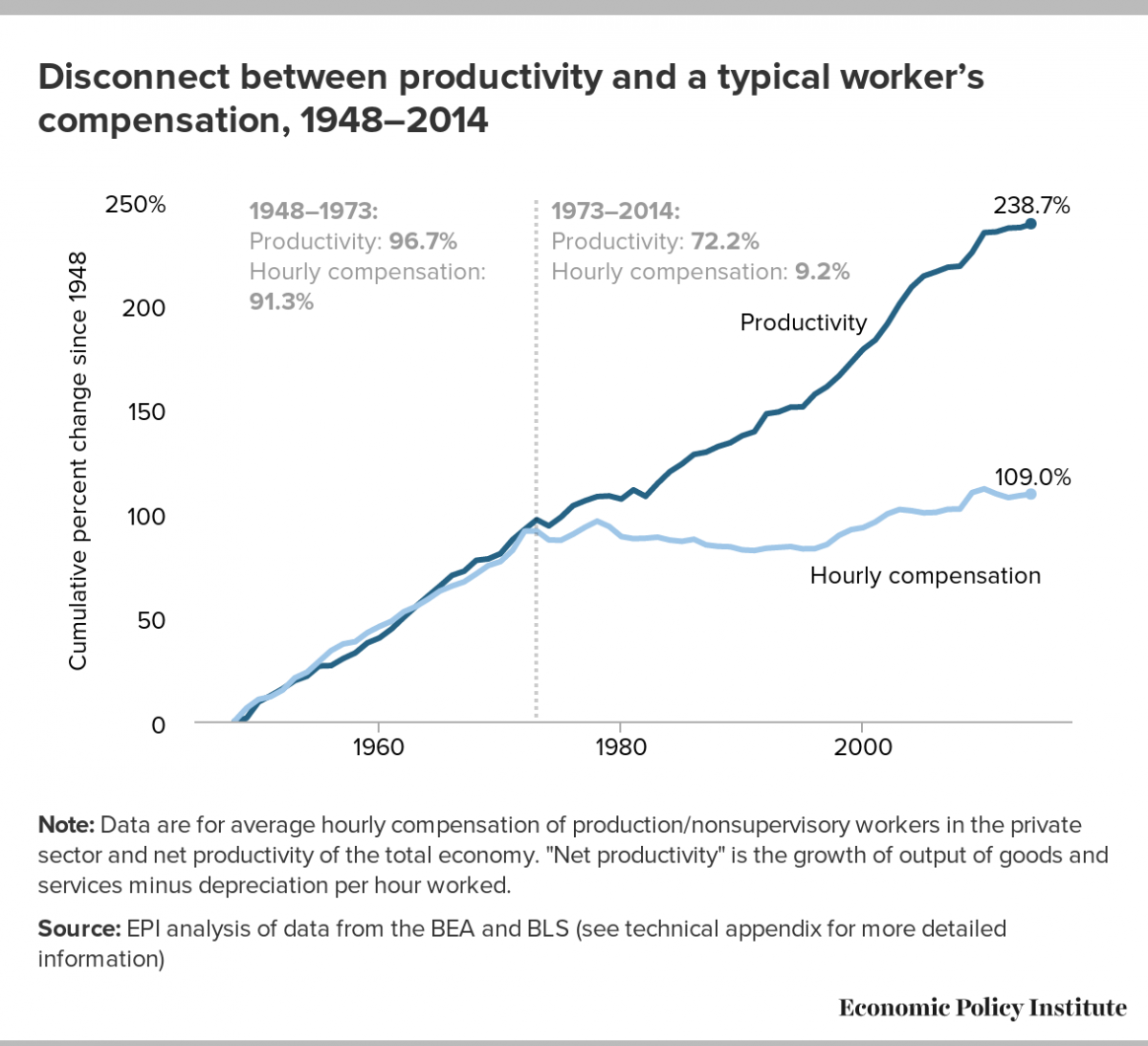I’m seeing 21.50 from articles in 2020 tying min wage to productivity. Maybe that’s the number basis? Or living wage? A living wage per state adjustment for one adult with one child seems to put lw around 30 in a lot of states, with the single adult needing 13-20.
I think the common sentiment is that minimum wage should be rated annually tied to a major factor on how much spending power that money has like inflation or productivity.
Minimum wage started in 1938 at $0.25. if it kept up with inflation today that would be $5.59, which is far from enough to survive with even the most basic rent and groceries.
“”" The dollar had an average inflation rate of 3.68% per year between 1938 and today, producing a cumulative price increase of 2,136.18%.“”"
Nice breakdown. And I agree that the better solution would be to figure out which metric to tie minimum wage to. I don’t really think throwing out a number every few years like the original reply I was responding to suggested is helpful. But it seems wildly popular here.
Because we’ve been arguing it should be at least 15 for 10 years, and inflation is a bitch and if federal minimum wage had tracked with inflation since it was implemented, it would be closer to 30 bucks an hour than to 15.
And it should be all at once. The instant it’s passed, $30/hr. None of us got eased into it when gas prices and grocery prices and rent and health insurance went up.
If you read the comments, it’s actually not. Inflation alone doesn’t account for pinning wages near $30, so that’s not really a good explanation given that it’s nonfactual. Even if he’s considering the living wage instead of historical minimums, $30 is still about 30% higher than what an average living wage would be. Is there some other consideration he has that I’m missing? I wouldn’t know without asking due to an unfortunate lack of psychic powers.
Anyways, sorry I asked for the policy reasoning behind a policy position. It clearly offended many, I realize my mistake, and won’t bring that kind of nonsense around here again.
What’s the basis for $30/hr? First time seeing that number in the wild.
Y’all really making this Reddit with less content. ¯\_(ツ)_/¯
And out comes the abacus.
Insightful
I’m seeing 21.50 from articles in 2020 tying min wage to productivity. Maybe that’s the number basis? Or living wage? A living wage per state adjustment for one adult with one child seems to put lw around 30 in a lot of states, with the single adult needing 13-20.
All good possible points, but only one person in this thread can answer what the number basis is, so who knows.
I think the common sentiment is that minimum wage should be rated annually tied to a major factor on how much spending power that money has like inflation or productivity.
Minimum wage started in 1938 at $0.25. if it kept up with inflation today that would be $5.59, which is far from enough to survive with even the most basic rent and groceries.
“”" The dollar had an average inflation rate of 3.68% per year between 1938 and today, producing a cumulative price increase of 2,136.18%.“”"
https://www.in2013dollars.com/us/inflation/1938?amount=0.25
Productivity however has decoupled from wages decades ago, here’s the EPI graph most reference:
If we re-coupled those values for minimum wage today that would be much higher. 3 years ago CBS reported it would be about $26: https://www.cbsnews.com/news/minimum-wage-26-dollars-economy-productivity/
Where did that money go instead of paying fair wages?
Nice breakdown. And I agree that the better solution would be to figure out which metric to tie minimum wage to. I don’t really think throwing out a number every few years like the original reply I was responding to suggested is helpful. But it seems wildly popular here.
Because we’ve been arguing it should be at least 15 for 10 years, and inflation is a bitch and if federal minimum wage had tracked with inflation since it was implemented, it would be closer to 30 bucks an hour than to 15.
And it should be all at once. The instant it’s passed, $30/hr. None of us got eased into it when gas prices and grocery prices and rent and health insurance went up.
I understand your sentiment, but if that’s your policy basis, you’d be asking for $10/hr instead of $15.
Not necessarily a bad idea, I just wanted to know how that number was generated, because without that data, it’s not necessarily a good idea either.
Just read the comments, the data is there.
If you read the comments, it’s actually not. Inflation alone doesn’t account for pinning wages near $30, so that’s not really a good explanation given that it’s nonfactual. Even if he’s considering the living wage instead of historical minimums, $30 is still about 30% higher than what an average living wage would be. Is there some other consideration he has that I’m missing? I wouldn’t know without asking due to an unfortunate lack of psychic powers.
Anyways, sorry I asked for the policy reasoning behind a policy position. It clearly offended many, I realize my mistake, and won’t bring that kind of nonsense around here again.